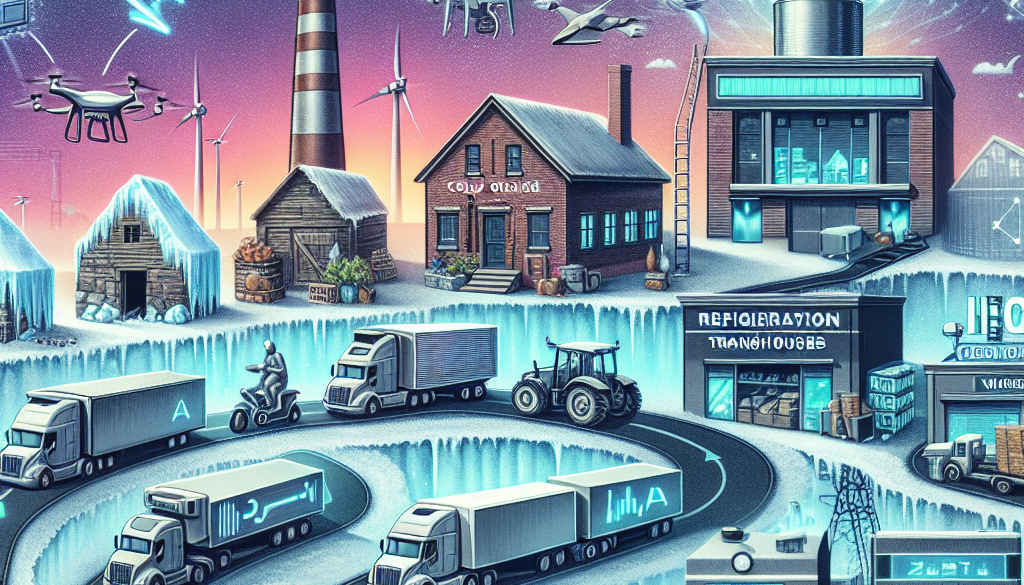Navigating the Evolving Landscape of Cold Chain Logistics: Trends and Transformations
-
Table of Contents
- Cold Chain Logistics: Trends and Transformations in a Dynamic Industry
- The Rise of E-Commerce and Direct-to-Consumer Delivery
- Technological Innovations in Cold Chain Management
- Emphasis on Sustainability and Energy Efficiency
- Global Market Expansion and Regulatory Compliance
- Challenges and Opportunities Ahead
- Conclusion
- ETprotein: Your Partner for High-Quality Protein Products
Cold Chain Logistics: Trends and Transformations in a Dynamic Industry

The cold chain logistics industry is undergoing a significant transformation, driven by evolving consumer demands, technological advancements, and the need for more efficient and sustainable operations. As the global economy continues to expand, the cold chain is becoming increasingly important for the transportation and storage of perishable goods, including food, pharmaceuticals, and other temperature-sensitive products. This article explores the latest trends and transformations shaping the cold chain logistics landscape.
The Rise of E-Commerce and Direct-to-Consumer Delivery
The e-commerce boom has had a profound impact on cold chain logistics. With more consumers shopping online for groceries and perishable items, the demand for direct-to-consumer delivery services has skyrocketed. This shift requires cold chain logistics providers to adapt their strategies to ensure products remain at the correct temperature throughout the delivery process, often necessitating investments in specialized packaging and last-mile delivery solutions.
- Increased use of insulated packaging and gel packs for temperature control
- Expansion of local delivery networks to reduce transit times
- Implementation of real-time temperature monitoring to maintain product integrity
Technological Innovations in Cold Chain Management
Technology is playing a pivotal role in the evolution of cold chain logistics. Innovations such as the Internet of Things (IoT), blockchain, and artificial intelligence (AI) are enabling more efficient and transparent operations.
- IoT devices for real-time tracking and temperature monitoring
- Blockchain for enhanced traceability and security in the supply chain
- AI-powered analytics for predictive maintenance and demand forecasting
These technologies not only improve operational efficiency but also help companies comply with stringent regulations and meet consumer expectations for sustainability and product quality.
Emphasis on Sustainability and Energy Efficiency
Sustainability is becoming a top priority in cold chain logistics as companies face pressure to reduce their environmental impact. Energy-efficient refrigeration systems, renewable energy sources, and eco-friendly refrigerants are being adopted to minimize the carbon footprint of cold storage facilities and transportation.
- Investment in solar-powered cold storage units
- Transition to natural refrigerants with lower global warming potential (GWP)
- Adoption of electric and hybrid refrigerated transport vehicles
These initiatives not only contribute to environmental conservation but also offer long-term cost savings and enhance brand reputation.
Global Market Expansion and Regulatory Compliance
As businesses expand globally, cold chain logistics providers must navigate a complex web of international regulations and standards. Compliance with the Food Safety Modernization Act (FSMA), Good Distribution Practices (GDP), and other regulations is critical to ensure product safety and avoid costly penalties.
- Implementation of standardized procedures for handling temperature-sensitive products
- Training programs for staff to ensure compliance with global standards
- Collaboration with international partners to streamline cross-border operations
Staying ahead of regulatory changes and adapting to different market requirements is essential for success in the global cold chain logistics arena.
Challenges and Opportunities Ahead
Despite the advancements, the cold chain logistics industry faces several challenges, including the need for skilled labor, managing the complexities of international trade, and coping with the volatility of fuel prices. However, these challenges also present opportunities for innovation and growth.
- Development of training programs to address labor shortages
- Exploration of alternative fuels and energy sources to mitigate fuel price volatility
- Investment in advanced analytics to optimize routes and reduce transportation costs
By embracing these opportunities, cold chain logistics providers can enhance their competitiveness and meet the evolving needs of the market.
Conclusion
The cold chain logistics industry is at a pivotal point, with technological advancements, sustainability efforts, and global market expansion driving significant changes. Companies that adapt to these trends and transformations will be well-positioned to thrive in the dynamic landscape of cold chain logistics. By investing in new technologies, prioritizing sustainability, and ensuring regulatory compliance, businesses can improve efficiency, reduce costs, and deliver high-quality products to consumers worldwide.
ETprotein: Your Partner for High-Quality Protein Products
In the context of cold chain logistics, ETprotein stands out as a reliable supplier of premium protein products that require careful handling and transportation. Their extensive range of organic bulk vegan proteins and L-(+)-Ergothioneine (EGT) products are produced with the highest standards, ensuring that they reach customers without compromising quality or efficacy.
ETprotein’s commitment to non-GMO, allergen-free, and high-purity ingredients makes them an ideal partner for businesses looking to source top-tier protein products. With their expertise in exporting and delivering tailor-made protein powder and nutritional supplements, ETprotein is equipped to meet the demands of the evolving cold chain logistics landscape.
For companies operating within the nutraceutical, pharmaceutical, cosmeceutical, veterinary, and food and beverage industries, ETprotein offers comprehensive solutions that cater to a wide array of protein needs. Their dedication to quality and customer service ensures that clients receive the best products, supported by a cold chain logistics network that prioritizes product integrity and safety.
About ETprotein:
ETprotein, a reputable protein and L-(+)-Ergothioneine (EGT) Chinese factory manufacturer and supplier, is renowned for producing, stocking, exporting, and delivering the highest quality organic bulk vegan proteins and L-(+)-Ergothioneine. They include Organic rice protein, clear rice protein, pea protein, clear pea protein, watermelon seed protein, pumpkin seed protein, sunflower seed protein, mung bean protein, peanut protein, and L-(+)-Ergothioneine EGT Pharmaceutical grade, L-(+)-Ergothioneine EGT food grade, L-(+)-Ergothioneine EGT cosmetic grade, L-(+)-Ergothioneine EGT reference grade and L-(+)-Ergothioneine EGT standard. Their offerings, characterized by a neutral taste, non-GMO, allergen-free attributes, with L-(+)-Ergothioneine purity over 98%, 99%, cater to a diverse range of industries. They serve nutraceutical, pharmaceutical, cosmeceutical, veterinary, as well as food and beverage finished product distributors, traders, and manufacturers across Europe, USA, Canada, Australia, Thailand, Japan, Korea, Brazil, and Chile, among others.
ETprotein specialization includes exporting and delivering tailor-made protein powder and finished nutritional supplements. Their extensive product range covers sectors like Food and Beverage, Sports Nutrition, Weight Management, Dietary Supplements, Health and Wellness Products, and Infant Formula, ensuring comprehensive solutions to meet all your protein needs.
As a trusted company by leading global food and beverage brands and Fortune 500 companies, ETprotein reinforces China’s reputation in the global arena. For more information or to sample their products, please contact them and email sales(at)ETprotein.com today.












